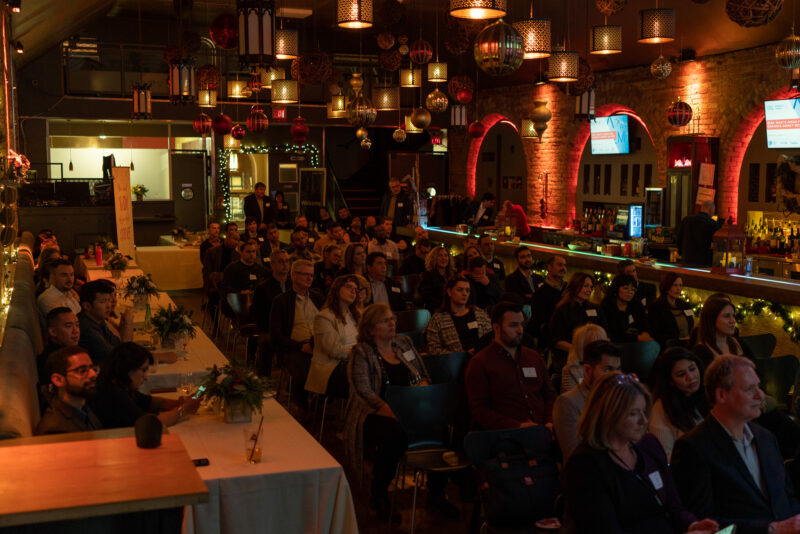2023: What’s Ahead for the Agency Sector?
Looking into the future, the Toronto Chapter of the American Marketing Association (AMA Toronto) recently gathered a diverse group of progressive agency leaders to predict and discuss the trends, challenges and opportunities facing Canadian marketers in 2023.
At the association’s annual Agency Panel event, influential thinkers from creative advertising, media, sponsorship, strategy and technology engaged a crowd of marketing and agency executives to talk about what to expect in the year ahead.
The lineup included Mark Harrison, founder, The T1 Agency, Leah Power, EVP, the Institute of Canadian Agencies (ICA); Mike Sutton, president & CEO, Zulu Alpha Kilo; Paul Tedesco, president, Track DDB North America; Sarah Thompson, president, Dentsu Media Canada; and moderator Sean Stanleigh, head of the Globe and Mail’s Content Studio.
“It’s an empowering narrative: braced against a pandemic-driven storm and the possibility of economic recession, the agency sector is resilient,” says Barbara Boyd, president of AMA Toronto. “Even wrestling with familiar themes — changing client expectations, DE&I, agency priorities and strategies — bellwether marketers are steering their businesses boldly and successfully into the future, leading us all forward.”
Guided by Stanleigh’s questions about the emerging marketing landscape, panelists revealed insights and provided much-needed aspiration. Here are five big takeaways from the discussion worth noting.

Retain talent by bringing in purpose and respect
The agency industry needs to change its approach to talent retention and make sure that entry-level employees thrive in this fast-paced environment. “The churn-and-burn approach is not the way to go anymore,” says Power.
In today’s playbook to retain talent, agency managers need to find better ways to nourish the culture of respect and collaboration, train and challenge junior people, and help employees embrace and love the industry.
The panelists agreed however, that the secret ingredient is ensuring people understand the purpose of their work, and how it’s connected to business success at their agency and with their client.
“We need to be purposeful as leaders leading our people, leading our agencies, and leading our clients. And the language we use has to be purposeful […] that’s the very first thing that indicates what culture we’re trying to set,” says Power, who advocates for over 120 agencies across Canada at the ICA.
Accelerated by the pandemic and reflective of this insight, is a clear shift from account management to customer service at leading agencies. It might sound good just to add a new shiny logo to an agency portfolio, but it’s also crucial to make agency employees “ears” to understand clients and their businesses to bring value and growth.
Shift client expectations from productivity to creativity and accountability
Throughout the first two years of the pandemic, when clients were going through unprecedented circumstances and changing their marketing plans constantly and unexpectedly, flexibility and nimbleness became the top expectations from brands.
And there continues to be a lot of conversations around productivity too, because it’s been viewed as a pandemic-driven challenge. But according to the panel, it’s time to move on and shift clients’ focus to other things that can help their businesses thrive.
“I think that what procurement and what the clients are sometimes buying, especially, when they’re buying an hour-times-rate, they’re buying productivity, and we need them to buy creativity. We need them to buy innovation, and to do that we need space and time,” pointed out Power.
Though productivity and creativity are crucial components of agency-client collaboration, aside from that it’s critical to integrate into the relationships some accountability as well. “Good marketers want their agencies to hold them to account, to push them, to challenge them, to help them understand where they are today, what they stand for and what they want to be and how to get there,” said Sutton, who leads one of North America’s most acclaimed creative agencies.
He added, “If we’re not doing that as an agency, what are we here for? If we’re working with clients who are not OK with us having a point of view and challenging them respectfully to hold them to account […] What are we really doing?”
Be intentional about DEI and hold clients to the same standards
More and more candidates applying for jobs in the agency sector ask DEI-related questions to see who’s walking the talk. These people would like to learn more about leadership diversity, real-world DEI actions and retention approaches.
Hiring managers need to open up to internationally-trained professionals, explore and appreciate their skill sets, and have meaningful conversations with them to understand their knowledge and expertise. It’s time to meet newcomers halfway by changing how employers are interviewing them and reviewing their resumes.
Harrison, who runs a successful sponsorship marketing firm, acknowledged that clients ask a lot of questions about what agencies and suppliers are doing to create diversity, equity, and inclusion. But he was quick to add that “the conversation needs to become a two-way street” because there’s still a lack of diverse voices and faces when you look across the table at a client’s marketing and management teams.
“Yes, it’s important for us to ensure that the agency community and the businesses we build are diverse, but I’d hold clients to the same standard,” concluded Harrison.
Help diversify media investment and revive local news
Waves of media restructuring, acquisitions and mergers have gutted newsrooms, shuttered many community papers, and led to fewer publications across Canada.
“If we want in Canada the rise of populism, if you want people to have misinformation, then the best thing you can possibly do is to have local news closed,” said Thompson, an outspoken media agency leader.
In her opinion, the media landscape and the buying and planning business was critically damaged when advertisers started chasing fast-moving metrics instead of circulation. What’s been undervalued in this age of fake news is the high level of trust that North Americans still have for local news to keep them informed, hold leaders accountable and amplify stories in their communities versus social media, community-based apps and word-of-mouth.
It’s time to shift the mindset and encourage brands to diversify their media investments to revive local news. This approach can help enhance democracy, support communities across the country, and reach customers on the local-level across the country, especially outside major city centres. An urban-centric mindset may lead to missing opportunities for clients.
Brands should diversify their media investment in a smarter way by advertising in community newspapers, not just with massive digital platforms.
Focus on creating value in the digital space
The tech disruption that we are experiencing right now has provoked many thoughts about adjusting digital marketing strategies.
Tedesco, who heads the digital arm of DDB, an iconic creative agency network, shared his ideas on data collection and analysis, and how to humanize the customer experience online to create better value.
He noted the pandemic has propelled the need to refine the customers’ journey. With every online journey unique, making marketing messages more personalized and relevant by getting rid of fluff and clutter has never been more important. Savvy digital marketing today can generate real value for customers and brands alike by making the experience simpler and more time-effective.
Tedesco reasons the most successful brands of the future will focus more on quality and creative messaging, stop insisting on extra digital actions, and move to one-click purchases.
The future, as always, belongs to the brave
“The annual Agency Panel, with its all-star lineup of thought-leaders, serves as a welcome reminder that the sector is a hardy, irrepressible force,” says Robert MacLean, VP of Public Relations, AMA Toronto, who spearheaded this year’s event.
“Yet the key message this event always delivers is famously summed up by the legendary adman Bill Bernbach: ‘Those who are going to be in business tomorrow are those who understand that the future, as always, belongs to the brave.’”
An Amazing Opportunity: IBM’s Marketing Leadership Excellence Summit
Thanks to the generous support of IBM Toronto, some of AMA Toronto’s volunteers and members had the opportunity to attend a summit hosted by IBM Canada and its CMO Jay Badiani December 15-17 in Niagara-On-The-Lake. We enjoyed the food and the ambiance at the Queen’s Landing Hotel while meeting other marketers and being introduced to Pepper the Robot which uses Watson AI. IBM speakers enlightened us on a range of topics: Jay Badiani (Let’s Create), Alison Cox (Human-centered Design), Tanmay Bakshi (How AI is reshaping Marketing), Fawn Annan of IT World Canada (What’s wrong with your MarTech) and Zlata Huddleston (Sustainability and what it means for Marketers).
Some of AMA Toronto’s volunteer community members also took the opportunity to conduct a full-morning off-site mid-year strategic planning session both in Niagara and back in Toronto. Many thanks to VP Partnership Miglena Nikolova for arranging this fabulous opportunity with IBM.

About the Author
Elvina Bulatova
Elvina Bulatova volunteers as director of public relations at AMA Toronto and works as a senior communications and design associate at Sustainalytics.
Photos and Videos
Event photos by AMA Toronto photographer, Yakov Radyushin.
Videos created by AMA Toronto videographer, Jeff Powell.



